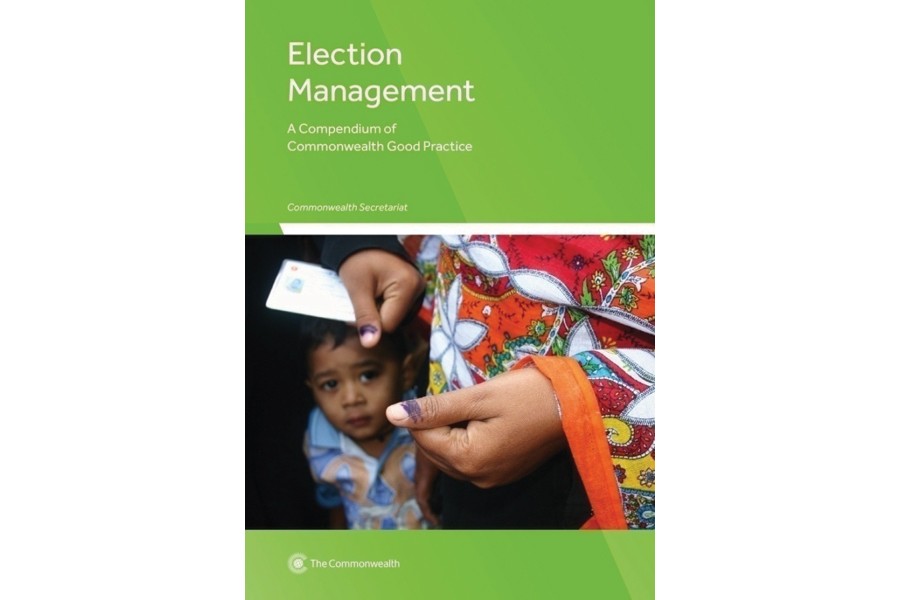We live in a changing world where people have ever-higher expectations with regard to the quality of their democracy. A country cannot be truly democratic until its citizens have the opportunity to choose their representatives through elections that are free, fair and credible. Such elections must be inclusive of all, besides respecting the rights of women and marginalised groups. Free and fair elections, undoubtedly, play a crucial role in political transitions by advancing democratisation and encouraging political liberalisation - helping to promote peaceful and democratic political transformation that can lead to increased stability and prosperity of a country. The Commonwealth publication
'Election Management: A Compendium of Commonwealth Good Practice` is a very timely initiative that provides policy makers and staff of election management bodies with a guide to the democratic values, principles and practices of the Commonwealth, which should be reflected in the work they do to consolidate and deepen democracy in their countries. It is also offered to assist governments, political parties and civil society organisations in understanding better the role, functions and responsibilities of those tasked with delivering credible elections. The compendium includes annexes from 45 Commonwealth election management bodies on their countries' standards for democratic legitimacy, legal frameworks, funding arrangements and administrative structure.
The publication is divided into four chapters. Chapter-1 titled 'Commonwealth Core Democratic Values and Principles' emphasises that elections are a means to an end - the objective is to secure and sustain the legitimacy of governments within a truly inclusive and democratic society. The popular demand for democratic progress is unstoppable. Such a democracy must be built on the firm foundation of respect for people, and their inalienable human, social and political rights. This means political equality and freedom from discrimination for all, the right to participate fully in the political process, to receive and disseminate information, and to associate freely with others in order to advance political views and interests.
Chapter-2 examines the independence of the election management body as an indispensable safeguard in protecting and defending constitutional order. Elections, if they are to be credible, must provide an open and fair contest among all those political parties as well as individuals who desire to compete for office - treating those who occupy government positions and those in the opposition on an equal basis. Independence is essential if the election management body is to establish such a level-playing field for elections. Experience, including within the Commonwealth countries, shows that the best way to achieve a fair contest is by creating a truly independent, constitutionally protected and well resourced election management body with effective control over all important aspects of the electoral process.
The third chapter looks in greater detail into the specific powers, functions and responsibilities of an independent election management body. In line with the conclusions of the Commonwealth Working Group, it argues, "The election management body must be independent and impartial, which means not being under external direction, control or subject to undue influence - including, and most crucially, on the part of the government but also of financial (local or foreign) and other interests". This chapter also explores the practical implications of the Commonwealth's values and principles with regard to the core functions of the election management body. It details the arrangements that need to be put in place to prevent incumbent governments taking unfair advantage of their position. It also discusses the responsibility of the election management body - with regard to staffing, funding, and management and administration - always to act with integrity and openness.
Chapter-4 examines a number of the key challenges facing election management bodies today as they organise elections that are not only 'free' but also 'fair'. The issues discussed are: i) achieving gender equity; ii) fair voting; iii) gerrymandering - designing electoral boundaries in such a manner as to give a particular party or a candidate an unfair advantage; iv) the politics of identity; v) intimidation and violence; vi) dirty money - political party expenditure and campaign funding; vii) meeting the challenge of social media; viii) democracy in small and island states; and ix) 'fair' or only 'free' elections? This chapter, however, informs us that topics discussed here are not exhaustive, nor are they designed to provide the last word on any of the issues under discussion. Their purpose is to bring to bear the core values and principles of the Commonwealth on some of the practical challenges facing election management bodies today as they work to strengthen democracy and improve the quality of elections in their own jurisdictions.
The compendium also contains annexes which reflect information provided by each Commonwealth election management body on certain country's standards for democratic legitimacy; the legal framework establishing the election management body; its funding arrangements; and its administrative structure. Evidence indicates that Commonwealth countries are gradually moving towards a common approach in regard to the need for, and the establishment and role of, independent election management bodies to ensure peaceful and credible elections.
S. M. Rayhanul Islam is an independent researcher.


